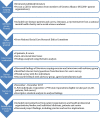Mental health care for rare disease in the UK - recommendations from a quantitative survey and multi-stakeholder workshop
- PMID: 35568910
- PMCID: PMC9107210
- DOI: 10.1186/s12913-022-08060-9
Mental health care for rare disease in the UK - recommendations from a quantitative survey and multi-stakeholder workshop
Abstract
Background: Rare disease patients and carers report significant impacts on mental health but studies on UK populations have focussed on relatively few, specific conditions. Collectively rare conditions represent a substantial health burden, with an estimated 3.5 million affected individuals in the UK.
Method: We explored the impact on mental health of living with a rare condition, and experiences of health service support, through an online survey. The survey assessed the impact of specific experiences commonly reported by those affected by a rare condition through multiple choice questions and Likert scale items, and open text question boxes. Through a multi-stakeholder workshop that involved facilitated discussion of our findings with patients/carers, clinicians and a government advisor, we developed recommendations for policy and practice toward a more person-centred and integrated approach.
Results: Eligible responses came from 1231 patients and 564 carers. Due to their rare condition, the majority of respondents (> 90%) had felt worried/anxious; stressed; and /or low/depressed. Thirty-six percent of patients and 19% of carers had had suicidal thoughts. Challenges that are particular to rare conditions and which negatively affect mental health included limited knowledge of the condition amongst healthcare professionals (88%), and not being believed or taken seriously by them. Only 23% of respondents felt healthcare professionals considered mental and physical health as equally important. Almost half reported never having been asked about mental health by healthcare professionals. Our findings indicate that access to, and appropriateness of, professional psychological support needs to be improved. Peer group support is important but signposting is inadequate. Our recommendations are for healthcare professionals to be supported to effectively and sensitively recognise and address patients' and carers' mental health needs; and for service level coordination of care to integrate professional psychological support with rare disease services.
Conclusion: Living with a rare disease substantially impacts mental health. Many of the drivers of poor mental health reflect issues specific to managing rare conditions. To meet UK government commitments, there should be a focus on empowering healthcare professionals who treat rare disease patients and on integration of mental health support with rare disease services.
Keywords: Health service; Mental health; Patient experience; Rare disease; Recommendations; Survey; Undiagnosed.
© 2022. The Author(s).
Conflict of interest statement
The authors have no competing interests to declare.
Figures







Similar articles
-
Promoting and supporting self-management for adults living in the community with physical chronic illness: A systematic review of the effectiveness and meaningfulness of the patient-practitioner encounter.JBI Libr Syst Rev. 2009;7(13):492-582. doi: 10.11124/01938924-200907130-00001. JBI Libr Syst Rev. 2009. PMID: 27819974
-
Experiences of coordinated care for people in the UK affected by rare diseases: cross-sectional survey of patients, carers, and healthcare professionals.Orphanet J Rare Dis. 2023 Nov 23;18(1):364. doi: 10.1186/s13023-023-02934-9. Orphanet J Rare Dis. 2023. PMID: 37996938 Free PMC article.
-
How are patients with rare diseases and their carers in the UK impacted by the way care is coordinated? An exploratory qualitative interview study.Orphanet J Rare Dis. 2021 Feb 10;16(1):76. doi: 10.1186/s13023-020-01664-6. Orphanet J Rare Dis. 2021. PMID: 33568181 Free PMC article.
-
Bridging the Gap between Health and Social Care for Rare Diseases: Key Issues and Innovative Solutions.Adv Exp Med Biol. 2017;1031:605-627. doi: 10.1007/978-3-319-67144-4_32. Adv Exp Med Biol. 2017. PMID: 29214594 Review.
-
Patients' and informal carers' experience of living with mesothelioma: A systematic rapid review and synthesis of the literature.Eur J Oncol Nurs. 2022 Jun;58:102122. doi: 10.1016/j.ejon.2022.102122. Epub 2022 Mar 23. Eur J Oncol Nurs. 2022. PMID: 35339776 Review.
Cited by
-
Idiopathic Intracranial Hypertension - How Can Orthoptists Help Improve Care?Br Ir Orthopt J. 2024 Dec 6;20(1):258-263. doi: 10.22599/bioj.427. eCollection 2024. Br Ir Orthopt J. 2024. PMID: 39650623 Free PMC article.
-
The impact of 22q11.2 deletion syndrome on caregivers: assessing quality of life and burden.Orphanet J Rare Dis. 2025 Jun 1;20(1):264. doi: 10.1186/s13023-025-03790-5. Orphanet J Rare Dis. 2025. PMID: 40452047 Free PMC article.
-
The rare disease burden: a multidimensional challenge.Acta Biochim Pol. 2025 Jul 14;72:14777. doi: 10.3389/abp.2025.14777. eCollection 2025. Acta Biochim Pol. 2025. PMID: 40726965 Free PMC article. Review.
-
Non-pharmacological rehabilitation interventions for individuals with antiphospholipid syndrome: A scoping review.Lupus. 2024 Feb;33(2):101-110. doi: 10.1177/09612033231223336. Epub 2023 Dec 19. Lupus. 2024. PMID: 38113856 Free PMC article.
-
Rare diseases: why is a rapid referral to an expert center so important?BMC Health Serv Res. 2023 Aug 23;23(1):904. doi: 10.1186/s12913-023-09886-7. BMC Health Serv Res. 2023. PMID: 37612679 Free PMC article.
References
-
- EU Research on rare diseases. https://ec.europa.eu/info/research-and-innovation/research-area/health-r.... Accessed 20 Dec 2021.
-
- Commission of the European Communities. Communication from the commission to the European Parliament, the council, the European economic and social committee and the Committee of the Regions on rare diseases. Europe's Challenges; 2008. https://ec.europa.eu/health/ph_threats/non_com/docs/rare_com_en.pdf. Accessed 20 Dec 2021.
-
- Shire. Rare disease impact report: insights from patients and the medical community. Jersey: Shire; 2013.
-
- Genetic Alliance UK . Rare Experience 2020. The lived experiences of people affected by genetic, rare and undiagnosed conditions. Genetic Alliance UK; 2020.
MeSH terms
LinkOut - more resources
Full Text Sources
Medical

